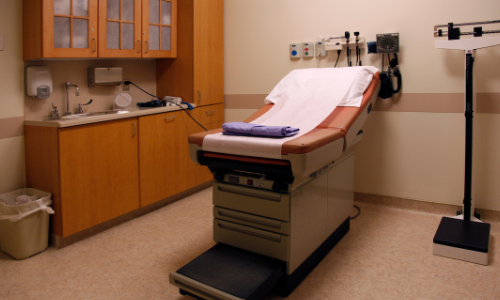 Have you ever gone to a health appointment where your provider didn’t seem to take you seriously because of your weight? Have you ever felt shut down or disrespected in an appointment where weight became the focus of too much of the conversation? Then you’ve experienced weight bias.
Have you ever gone to a health appointment where your provider didn’t seem to take you seriously because of your weight? Have you ever felt shut down or disrespected in an appointment where weight became the focus of too much of the conversation? Then you’ve experienced weight bias.
This happens every day to people living with obesity. Being treated differently because of one’s weight is an example of weight bias – and unfortunately, it’s found often in healthcare. However, there are many providers out there who treat higher-weight patients with empathy and respect – and those providers are the examples we need to set for what quality care should look like for people with obesity.
Recently, an OAC Member shared an experience she had with weight bias in a private forum. We knew that her story was powerful because many people can relate to it. At the end of this story, the OAC Member didn’t just accept this bias. She took action to fight it because she knew it was wrong.
We hope her story will inspire you to do the same if it ever happens to you, or to help someone you know who is struggling against weight bias and its harmful effects.
Story shared by Anonymous:
Recently, I had a health appointment to establish care with a new rheumatologist after my former doctor left. Although I had only been seeing my previous doctor for about 6 months, this has been a 3-5 year medical journey that has included countless labs, imaging tests, and treatments to get to the bottom of troubling symptoms that affect me daily.
The Appointment:
When I stepped on the scale in the clinic, I was not surprised by the number. I am 5 foot 11 inches and that day weighed 295 lbs. In my adult life, I have never been considered as having a “normal” BMI. After a lot of struggle with my weight and self-acceptance, I’ve realized that focusing purely on the number on the scale is not useful or beneficial as a measure for my overall health and well-being. I focus instead on the positive steps I take to impact my health. I exercise five days a week and attempt to have a balanced diet, and yet the numbers don’t often significantly move for me. It is something I accept and I fully take accountability for my health and life choices.
 When the doctor enters, I attempt to rehash the last five years of symptoms, treatments, and investigations. It is clear to me that she has not taken the time to read my chart. She does not seem familiar with any of the results of the labs or imaging tests I have done. Instead of listening to my concerns and looking at the whole picture of my health, she immediately has a laser focus on my weight. She asks me about exercise and meets me with a disbelieving look when I explain my routine.
When the doctor enters, I attempt to rehash the last five years of symptoms, treatments, and investigations. It is clear to me that she has not taken the time to read my chart. She does not seem familiar with any of the results of the labs or imaging tests I have done. Instead of listening to my concerns and looking at the whole picture of my health, she immediately has a laser focus on my weight. She asks me about exercise and meets me with a disbelieving look when I explain my routine.
Next, she interrogates me about my diet. Dismissing my answers, she informs me that I ought to eat two hard-boiled eggs every morning and a handful of almonds for lunch. My anaphylactic nut allergy clearly listed in the chart is just more evidence that she has not looked past my weight. She is skeptical when I inform her that I do not have hypertension or diabetes, and she tries to warn me of the dangers of obesity. This is all despite evidence listed in the medical records that I have healthy blood glucose levels and good blood pressure. From her additional comments, I am left with the impression that while she will jump through the hoops to investigate my case, she does not think there is anything wrong with me aside from my weight. She gives me a brief physical exam and leaves.
Taking Action:
After crying in the exam room, I collected myself and left feeling hopeless and disheartened. I know I cannot go back to see this provider, but if I need to see another rheumatologist, I have to go more than 50 miles away. The more I thought about it in the following week, I could not shake how completely inappropriate this provider’s behavior was.
I am a nurse and I have seen first-hand how weight bias has been inflicted on patients throughout my career. I had not personally experienced it to this level before, always opting to beat the doctor to the punch in previous medical encounters. I decided to take action both for myself and for the countless other patients who are hesitant to seek care or are disregarded simply because of weight bias.
“Once we speak up and call out weight bias for what it is – abuse and discrimination – we can take our power back.”
 I knew from my experience as a nurse that health systems typically have a way for patients to bring complaints or grievances forward. I drafted a letter to my health system’s patient experience department that outlined my experience and I sent it with the intent that this provider will be informed of her inappropriate and harmful behavior. In addition, I decided to research obesity action groups to share my story and bring to light this experience that I know so many people sit in shame with. I encourage others to find advocates in their communities and healthcare systems. Once we speak up and call out weight bias for what it is – abuse and discrimination – we can take our power back.
I knew from my experience as a nurse that health systems typically have a way for patients to bring complaints or grievances forward. I drafted a letter to my health system’s patient experience department that outlined my experience and I sent it with the intent that this provider will be informed of her inappropriate and harmful behavior. In addition, I decided to research obesity action groups to share my story and bring to light this experience that I know so many people sit in shame with. I encourage others to find advocates in their communities and healthcare systems. Once we speak up and call out weight bias for what it is – abuse and discrimination – we can take our power back.
Speak up Against Weight Bias!
If you have experienced weight bias or recognized it happening somewhere else, here are some OAC resources you can use to take action and speak up:
- OAC’s Stop Weight Bias Campaign
- Weight Bias Guides (Healthcare and the Workplace)
- Weight Bias Reporting Tool
- Guidelines for Media Portrayals of Individuals Affected by Obesity
- Understanding Obesity Stigma Brochure
You can also reach out to us at info@obesityaction.com or share your story at WeightoftheWorld.com to speak up and encourage others. Weight bias in any form is harmful and not okay. We have to take a stand, together!
